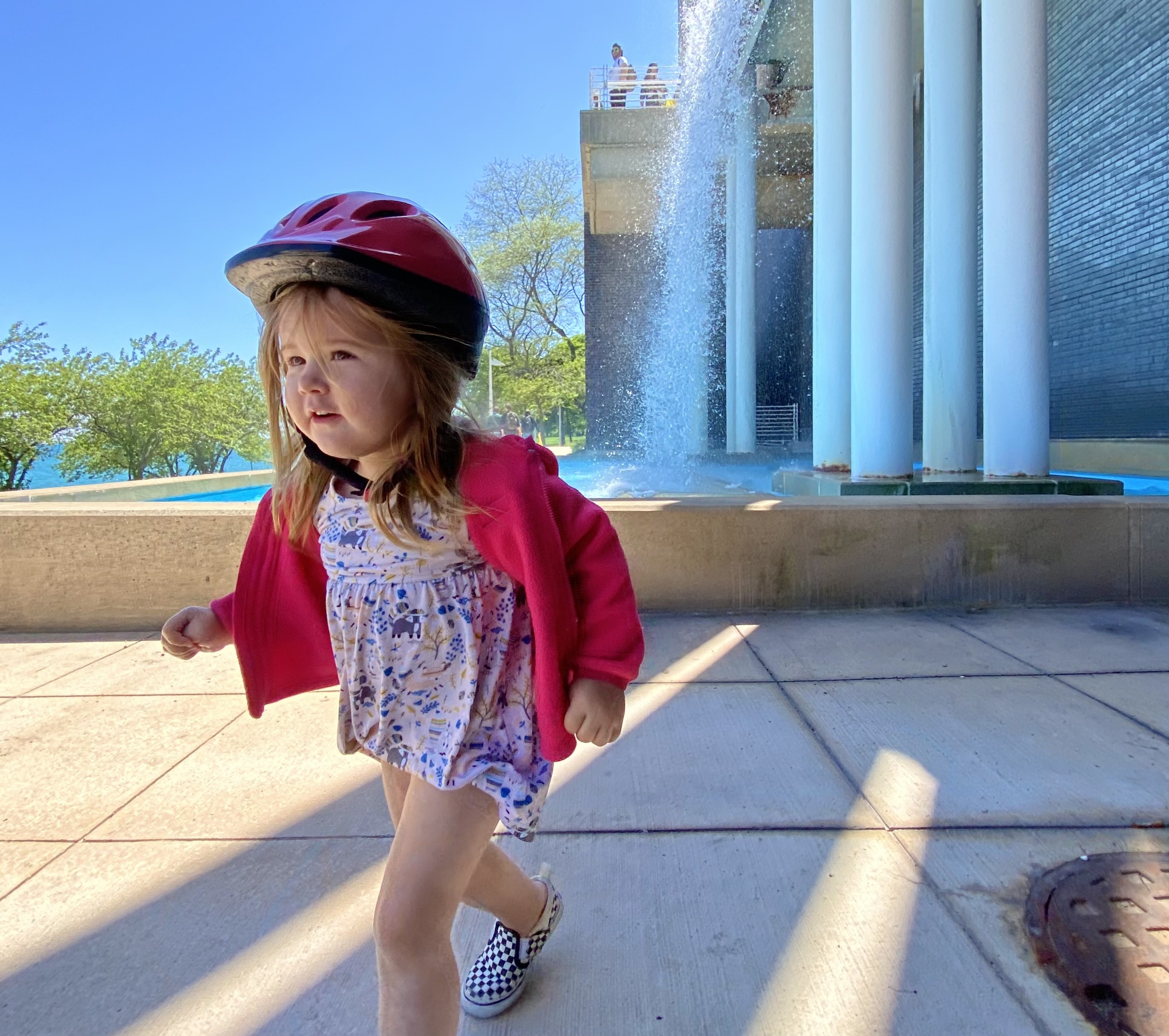Content warning: This post includes a description of children's deaths.
The death of a small child is the most awful thing that can happen to a parent. Sadly, the Chicago Police Department made things even worse for the loved ones of Elizabeth Grace Shambrook, the 3-year-old who was killed by a semi driver yesterday on Leland Avenue in Uptown, by suggesting that her mother caused the crash.
Meanwhile, neighbors are questioning why so many semi drivers use Leland, a mostly residential street with a preschool, in the first place. And a protest planned to honor the girl and Raphael "Rafi" Cardenas, 3, another toddler who was killed by a driver last week in nearby Lincoln Square, and demand safer streets for families.
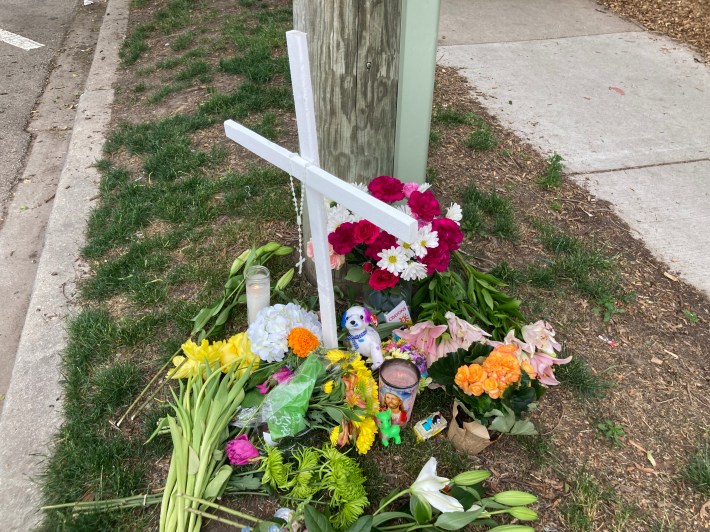
False narrative from CPD
At about 8:15 a.m. on Thursday, June 9, the girl, who went by Lily Grace or Lily, was riding in a child seat on the back of her mother's bike, heading east on the 1100 block of Leland. An eastbound Mondelez semi-truck driver struck the bike, then ran over the girl, fatally injuring her. Here's here the initial police statement on the case released that morning:
The victim, a 3-year-old female, was on the back of a bicycle being operated by an adult female. As they were traveling in the same direction as a semi truck at the above location, the bicyclist lost control and collided with the truck’s cab. The bike then fell to the ground, and the 3-year-old was struck by the truck. The victim was transported to Lurie Children’s Hospital, where she was pronounced. No other injuries were reported. [The Major Accidents Investigation Unit] is on scene investigating.
In fairness, there were many unknowns about the case at that point. But rather than using neutral language like, "the semi truck driver and the adult bike rider collided," the police clearly stated that the crash occurred because the mother "lost control and collided with the truck's cab." In other words, the statement implies, it was her fault, and there was nothing that the semi driver, or anyone else, could have done to prevent the tragedy.
Most local media outlets simply ran a version of the statement, basically quoting that phrase and spreading the narrative. Here's a typical report from CBS Chicago. "Breaking news from Uptown," says the anchor. "A really sad story to start our news. A three-year-old girl is dead after her mom lost control of the bike they were riding on and collided with a semi-truck."
In addition to the Mondelez semi, a ComEd truck was parked at the southwest corner of the intersection of Leland and Winthrop Avenue, where the crash took place. However, that company maintained that their driver had nothing to do with Lily Grace's death. Yesterday ComEd said in a statement to Block Club Chicago that "the crash did not involve the ComEd truck."
As more details emerged about what happened, it became clear that both the initial police statement and ComEd's statement were inaccurate. The CPD traffic crash report, released later in the day, with a longer narrative based on testimony from Lily Grace's father, who was following behind his wife and daughter on another bike, plus multiple other witnesses. The report notes that Leland, a residential roadway which is designated by the city as a bike-priority Neighborhood Greenway street, has bike lanes, and the ComEd trucker was "illegally parked... within 30 feet of the stop sign and in the bike lane," so that the mother was forced to leave the bike lane and enter the mixed-traffic lane. That driver was later ticketed for those two violations.
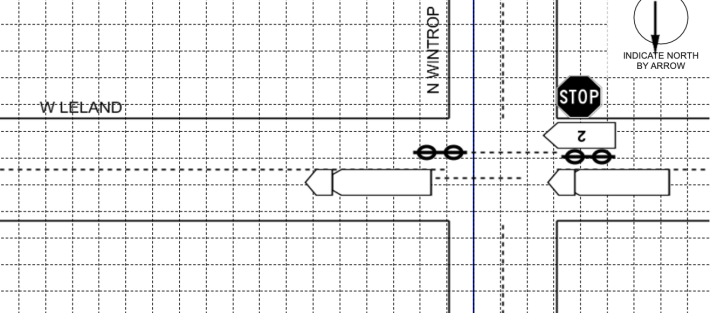
The crash report goes on to state that when the Mondelez semi driver pulled up to the stop sign, several witnesses said, the mother found herself in a narrow space, squeezed between between the semi and the parked ComEd truck. As the semi driver moved forward, the report states, the mother "became startled [and] over-corrected her bike." The driver clipped her, and she fell.
At that point, the report states, Lily Grace, who was wearing a helmet, "became trapped under the rear wheel of the semi truck and was rolled over by its tires for approximately 20-30 feet." The semi driver stopped just past the intersection, but by that time it was too late.
"We just heard screaming and then we turned around and, I'm assuming it was the father, just pounding on the truck to back up so they could pull the child out from under it," witness Tim Bartsch told ABC Chicago. Paramedic pronounced the girl dead at the scene at 8:34 a.m.
“She was far too bright a light, and this is devastating,” the father, who asked for anonymity, told the Sun-Times. He described her to ABC as smart, funny and vibrant. "We are devastated at the loss of our sweet little girl," he wrote to Streetblog, adding that Lily Grace "loved going for bike rides."
Why was the semi driver on Leland?
In the wake of the tragedy, residents on Leland said they've been concerned about the many large trucks using the side street for years, and tried to do something about it. They noted that Christopher House runs a preschool just east of the crash site. “Every morning you hear semis going up and down this street,” neighbor Heather Willett told Block Club. She added that another resident contacted the 46th Ward office a couple of years ago to ask that semis be banned from the street, but was told that require designating Leland as a boulevard. Trucks are banned from Chicago boulevards, but for some reason the ward indicated that was a non-started.
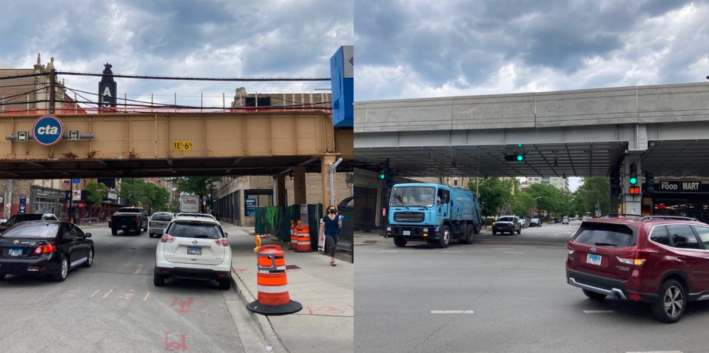
A Streetsblog reader tweeted out a possible reason why semi drivers frequently use Leland. Lawrence Avenue, the parallel arterial street one block north, has a low viaduct at the Lawrence Red Line station, directly north of the crash site, with only 11'6" of clearance. But the Red Line viaduct at Leland, where the tracks were replaced and raised several years ago, are significantly higher.
"We always had to reroute tour buses down Winthrop from Lawrence and onto Leland because the overpass is too low on Lawrence," the reader said. While it's not clear where the eastbound Mondelez semi driver was heading at the time, a possible scenario is that he headed south from Lawrence onto Leland due to the low viaduct at the station.
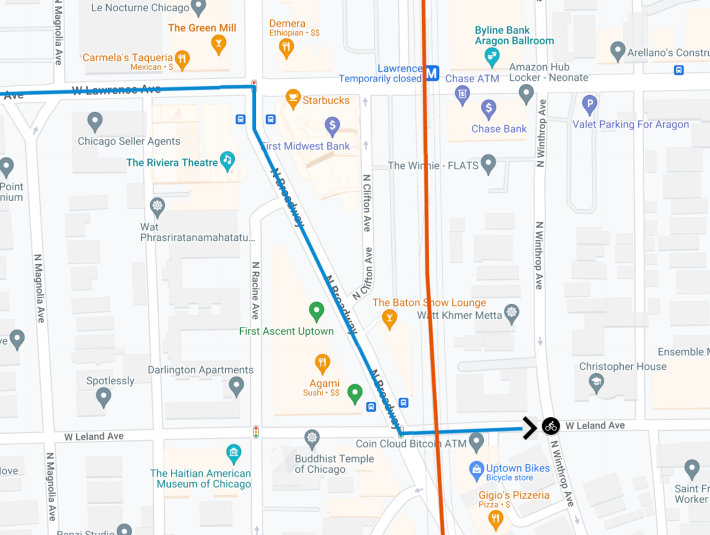
CTA spokesperson Tammy Chase confirmed that the tracks at Lawrence, where the station is currently closed for reconstruction as part of the Red and Purple Modernization project, will be raised at least five feet. "The entire new track structure that is being built between Lawrence and Bryn Mawr stations will be higher to meet modern local and state structural height requirements." Hopefully that means Leland will see much less semi traffic in the future.
Walk + Roll for Safe Street this Sunday
Traffic safety advocates are channeling their grief and anger over Lily Shambrook's death, and last week's killing of Rafi Cardenas, a half block south of Leland in neighboring Lincoln Square, to demand that Chicago and Illinois officials take decisive action to create safer streets. They're holding a family-friendly Walk + Roll event this Sunday, June 12, at 10:15 a.m., starting at Eastwood Avenue and Leavitt Street, where an SUV driver fatally struck Rafi on a mini scooter. The event will include a few speeches, a moment of silence for each child, and a 1.4-mile journey by foot, stroller, skate, scooter, and bike to Lily's crash site. All community members are invited to show up with signs calling for safer conditions for all road users, especially children and families.
The event is organized by the Chicago Family Biking organization, the Better Streets Chicago advocacy group, and local advocate Sz Donnelly, with support from FK Law, Active Transportation Alliance, Women Bike Chicago, Keating Law Offices, Ride Illinois, Ride of Silence Chicago, and advocate Mike Perrino.
"At the heart of the problem is Chicago’s car-centric approach to road design and the dangerous driving behaviors it enables," the organizers said in a statement. "The city knows what safe streets look like, but all too often they fail to build them. Many projects have been in discussion for over a decade, but they don’t see the light of day because of pushback from a small number of vocal residents and aldermanic privilege... Safe streets should not be up to public opinion. Safe streets should be the default."
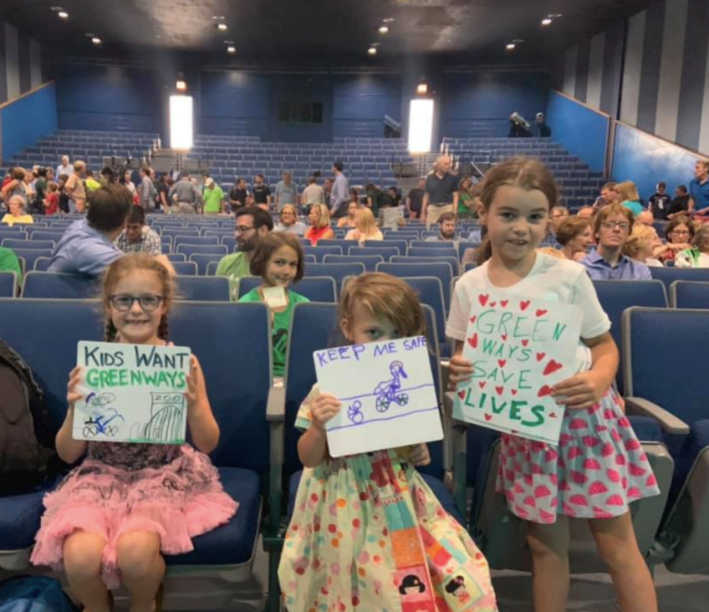
The advocates called on city and state leaders to:
- "Prioritize pedestrian and bike safety over parking by implementing expert-recommended, gold-standard road designs instead of watering them down for the small but loud anti-bike crowd."
- "Require all large trucks to be outfitted with side guards, not just city contractors, and reinforce and expand limits on their access to neighborhood streets."
- "Address Chicago’s poorly enforced illegal parking crisis through radical street design that includes safe loading zones and focuses enforcement and consequences on the most dangerous offenders."
The organizers are also calling on fellow residents to commit to creating safer streets:
- "Leave 10 minutes early when driving so you don’t feel rushed and make unsafe driving choices or treat neighborhoods like shortcuts."
- "Pause your own agenda when you drive near people walking, rolling, or biking."
- "Call your representatives and work with your neighbors to show up in support of these transformational projects that will save lives."
"It’s time for the city... to stop forcing communities to beg for safety after every tragedy," the organizers concluded. "The city can and should build safe infrastructure to prevent further loss of our friends, family, and loved ones. A better future is possible – and Chicago must act now."
